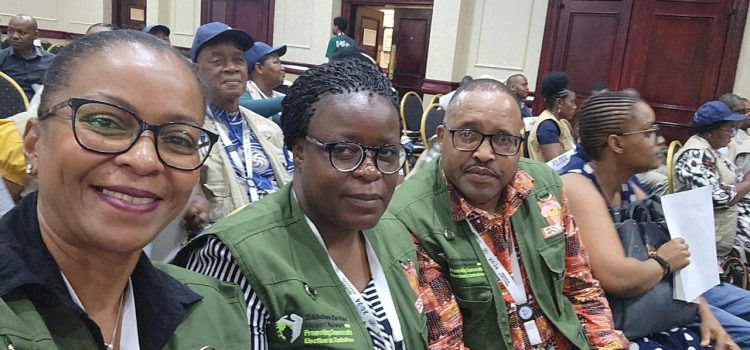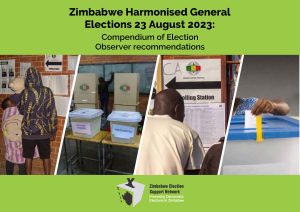At the invitation of the Zimbabwe Electoral Commission (ZEC), the Zimbabwe Election Support Network (ZESN) observed the Glenview South by-election that was held on 12 April 2025. The by-election in which the Zimbabwe African National Union – Patriotic Front (ZANU-PF) party won, was held after a vacancy arose following the death of Honourable Gladmore Hakata who served as the Constituency Member of Parliament under the Citizens Coalition for Change (CCC) during the 2023 Harmonised Elections.
Glen View South National Assembly By-election Report
NAMIBIA’S 2024 PRESIDENTIAL AND NATIONAL ASSEMBLY ELECTIONS OBSERVATION
The Electoral Support Network of Southern Africa (ESN-SA) and the Zimbabwe
Election Support Network (ZESN) jointly deployed a small delegation comprising
experienced observation practitioners to Namibia’s 2024 Presidential and National
Assembly elections. The Mission conducted extensive research and met with a wide
range of electoral stakeholders, including other international observation missions,
members of the legal fraternity, media experts, and Civil Society Organisations (CSOs) representatives.
The primary objective of the Joint Observer Mission was to evaluate whether the
Namibian electoral process adhered to national laws and to determine if the
country’s electoral framework aligns with regional and international principles,
norms, standards, and best practices. This initiative underscores the two
organisation’s dedication to advancing democratic integrity and transparent
electoral processes throughout the Southern African Development Community
(SADC) region.
The Joint Mission observed the opening of polling stations in the Khomas region.
These were characterised by long, winding queues well before opening. Each voting
station had an average of 7 voting officials, with a notable predominance of young
female presiding officers and youthful polling officials. Procedures, including
verifying voters’ names on the roll, checking for ink on fingers, and stamping ballot
papers with the Electoral Commission of Namibia (ECN), were consistently followed,
with a notable exception in some polling stations where polling officials responded
differently to instances where tablets used to verify voters overheated.
ESN-SA ZESN JOINT PRELIMINARY STATEMENT ON NAMIBIA’s PRESIDENTIAL AND NATIONAL ASSEMBLY ELECTIONS
INTRODUCTION
The Electoral Support Network of Southern Africa (ESN-SA) and the Zimbabwe Election Support Network (ZESN) jointly deployed a small delegation comprising experienced observation practitioners to Namibia’s 2024 Presidential and National Assembly elections. The members of the Mission were drawn from Botswana, Eswatini, South Africa and Zimbabwe. The primary objective of the Joint Observer Mission was to evaluate whether the Namibian electoral process adhered to national laws and to determine if the country’s electoral framework aligns with regional and international principles, norms, standards, and best practices. This initiative underscores the two organisation’s dedication to advancing democratic integrity and transparent electoral processes throughout the Southern African Development Community (SADC) region.
METHODOLOGY
The accreditation process for the Joint Mission by the Electoral Commission of Namibia (ECN) was seamless. On Election Day, the joint Mission deployed its team members to Khomas, Otjozondjupa, and Hardap regions. The Mission conducted extensive research and met with a wide range of electoral stakeholders, including other international observation missions, members of the legal fraternity, media experts, and Civil Society Organisations (CSOs) representatives. In its assessment of the elections, the joint Mission used various global, regional normative and legal instruments for democratic elections, such as the African Charter on Democracy, Elections and Governance (ACDEG), the SADC Principles and Guidelines Governing Democratic Elections, the Principles for Election Management, Monitoring, and Observation (PEMMO) together with the Namibia’s legal framework. The Joint Mission closely observed voting on 27 November 2024.

ZESN-ESN-SA Botswana Election Report
In response to an invitation from the Government of the Republic of Botswana, the
ZESN and ESN-SA deployed an Election Observation and Learning Mission (EOM) to
observe the Botswana General Elections held on 30 October 2024. The team observed
voting in urban, peri-urban and rural areas around Gaborone. Prior to the Election Day
observation, the team met with various electoral stakeholders.
SIGNIFICANCE OF EFFICIENT VOTER REGISTRATION IN MODERN DEMOCRACIES: REFLECTING ON ZIMBABWE’S PROPOSED ELECTORAL REFORMS
Voter registration is crucial, yet intricate aspect of any electoral process. Though
costly, time-consuming and a complex electoral process, it serves as a foundational
cornerstone of democratic systems, defining who can participate in selecting political
leaders. The effectiveness and credibility of any election hinges on proper voter
registration, which adds value to the electoral process. Conversely, inadequate and
flawed voter registration has repercussions, detrimental to electoral outcomes. Faulty
voter registration automatically translates to a faulty election and equally
questionable outcomes.
Voter registration can be continuous, periodic, or civil, each form with its distinct merits and demerits. In Zimbabwe, voter registration is continuous to ensure the voters rolls remain up-to-date. Prospective registrants physically appear at the ZimbabweElectoral Commission (ZEC) local District Office to register, and a voters’ roll is compiled. However, this process has faced significant contestations and criticism for allegedly undermining electoral processes and outcomes. Concerns about impact on electoral integrity, inclusivity, accuracy, transparency, and security have been raised.
Currently, the Constitution of Zimbabwe designates the ZEC as the primary body responsible for voter registration, along with other electoral duties like the delimitation of electoral boundaries. In March 2024, a proposal to (i) shift voter registration responsibilities from ZEC to Civil Registration Department (CRD), (ii)automatically register new registrants upon attaining 18, and (iii) automatically remove deceased from voters’ roll at the issuance of a death certificate emerged, with a repeat of the same call in November 2024. In view of this proposal, critics maintain that a clean, accurate,e and complete voters roll—resulting from a comprehensive registration process conducted by an independent body directly involved in elections is crucial for the health of Zimbabwe’s democracy.
Revised Position Paper on POLITICAL PARTY REGULATION IN ZIMBABWE
The centrality of political parties to democracy in Zimbabwe is unanimously acknowledged. However,
there is often a contradiction where political parties that have glaring capacity deicits expect that
everything around them has to change to meet their demands while they continue to operate the same
way. That is, parties expect to be funded by the state, demand constitutional and electoral reforms yet
remain silent on the pragmatics of how they too need to comply with the formal rules and regulations of
the game. Political parties ought to be regulated through a mechanism that establishes the minimum
requirements in terms of how they organize themselves and conduct their business. Regulation should
embody how political parties are registered, deregistered and how they access inances, manage and
account for their inances whether provided under the law, donations or otherwise.
In Zimbabwe, political parties inancing has been the sole regulated aspect, with other aspects such as
registration and deregistration remaining unregulated, raising accountability and internal democracy
challenges. The absence of a legislation regulating political parties in Zimbabwe has been identiied as the
major problem contributing to lack of sanity in some of their operations. Consequently, the country is
faced with challenges of election related disputes and conlict, volatile party systems and lack of political
party accountability. Absence of legislation regulating political parties has also led to a wide range of
other electoral challenges, impacting the integrity and effectiveness of democratic processes particularly
in the 2023 elections. Additionally, this situation contributed to the administrative challenges faced by the Zimbabwe Electoral Commission (ZEC) and other electoral stakeholders who engage with political
parties. Following the CCC 2023 recalls and the subsequent by-elections to ill the vacant seats, the
Minister of Justice, Legal and Parliamentary Affairs highlighted this burden, suggesting that political
parties ought to be register. In his view, ‘structureless parties were engaging in endless squabbles and
recalls of parliamentarians, wasting state money that could be better utilized for other purposes’¹.
Zimbabwe Harmonized General Elections 23 August 2023: Compendium of Election Observers Recommendations
The video you are about to watch serves as a comprehensive overview of the critical issues highlighted in our Compendium of Election Observers Recommendations. It provides an engaging platform for our advocacy efforts, combining expert analysis with visual storytelling. The video not only sheds light on observations made but also offers tangible solutions for reform. We hope it will inspire constructive dialogue among policymakers, Chapter 12 Commissions, civil society organizations, electoral stakeholders and the electorate.
Zimbabwe Harmonized General Elections 23 August 2023: Compendium of Election Observers Recommendations
Report on the 27 April 2024 National Assembly By-Elections
Zimbabwe conducted two (2) by-elections on 27 April 2024 to fill vacant constituent seats of Mount Pleasant and Harare East. This was in accordance with Statutory Instrument 37A of 2024, Proclamation 1 of 2024. Constituency vacancies occurred following the resignation of Fadzayi Mahere and Allan Markham Rusty who were elected on the Citizens Coalition for Change (CCC) party ticket, during the August 2023 Harmonised Elections. On 20 February 2024, the Speaker of Parliament announced the vacancies. Following the declaration of vacancies, the President of Zimbabwe officially scheduled 26 March for receiving nomination papers from the prospective candidates and 27 April as the election date. Accordingly, March 26 Nomination Court convened in Harare at the Rotten Row Magistrates Court to receive candidates’ nomination papers and a by-election was subsequently held on 27 April.
Harare East and Mount Pleasant are urban constituencies found in Harare Metropolitan Province. Harare East Constituency consists of high, medium and low-density suburbs of Harare. Areas like Tafara, Gletwyn, Borrowdale, and Glen Lorne among others were combined during the 2022/2023 Delimitation Exercise to meet the Constituency threshold. As far as possible communities with the same interest were contained in same wards in line with Section 161 (6) (d) of the Constitution, the delimitation exercise mixed communities with different interests to meet the constitutional voter population threshold for the Harare East, resulting in a mix of communities with different interests in this Constituency.
Mount Pleasant is also primarily a residential constituency, that shares borders with Hatcliffe, Harare East, Harare Central and Harare West Constituencies. The Constituency was created in 2oo8 following the 2007/2008 delimitation exercise and was reconfigured again in the 2022/2023 delimitation exercise.
2023 HARMONISED ELECTIONS: POST ELECTION REVIEW AND LESSONS LEARNT CONFERENCE REPORT
The Zimbabwe Election Support Network (ZESN) held a two- day Conference in Bulawayo
from 28 to 29 February 2024 with the overall objective; to review the 2023 Harmonized
Elections focusing on the legislative framework, the administrative framework and the
political environment. The meeting also analyzed the role of Civil Society Organisations
(CSOs) and other electoral stakeholders in the elections. More specifically, the Conference
sought to facilitate a constructive evaluation and well-informed review of the 2023
Harmonized Elections by reflecting on the successes, failures and lessons learnt in the
elections. It also sought to share an understanding among stakeholders of the gaps in the
electoral framework as well as stakeholders’ input on the recommendations to be
adopted ahead of the 2028 Harmonized Elections and by-elections that take place in
between.
The Conference was attended by 130 delegates drawn from ZESN Member
organisations, the Chapter 12 Institutions Supporting Democracy, political parties,
members of the academia, media organisations, other CSOs’ Community-Based
Organisations (CBOs) and Faith-Based Organisations (FBOs) working on elections and
representing various interests groups like women, youth and Persons with Disabilities
(PwDs). Among the Chapter 12 Institutions were representatives from the Zimbabwe
Gender Commission (ZGC), Zimbabwe Human Rights Commission (ZHRC) and the
Zimbabwe Media Commission (ZMC). Political parties represented at the workshop
included Zimbabwe African Union- Patriotic Front (ZANU-PF), the Citizens Coalition for
Change (CCC), United Zimbabwe Alliance (UZA) and the Labour Economists African
Democrats (LEAD).
The presentations at the Conference covered various themes, including the legislative
and administrative framework, the political environment and the role of CSOs and other
electoral stakeholders. Other themes examined included political party campaign
strategies and messaging, electoral dispute resolution mechanisms, the role of the media
in elections and key lessons and recommendations from the 2023 elections. The
Conference featured presentations and panel discussions led by experts, practitioners,
and observers who offered diverse perspectives on the 2023 elections.
